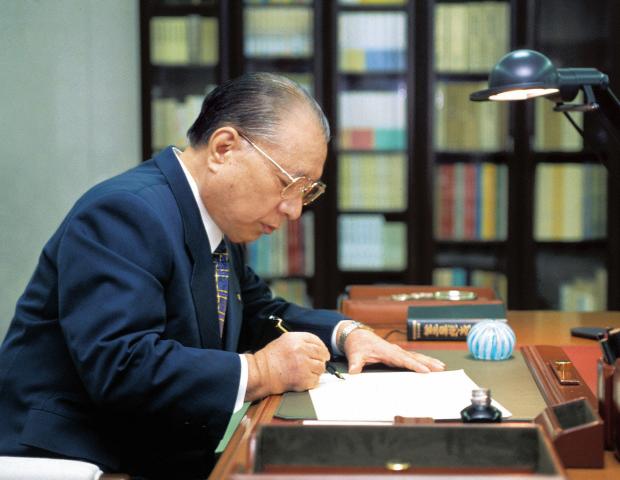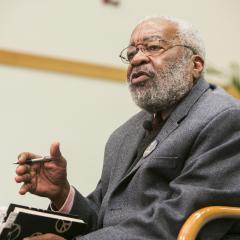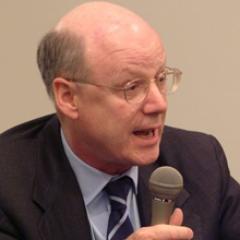Daisaku Ikeda's Preface to America Will Be!
Daisaku Ikeda
In his Preface to our 2013 publication, America Will Be!: Conversations on Hope, Freedom, and Democracy, Daisaku Ikeda pays tribute to his friendship with his co-author, Vincent Harding, and offers beautiful reflections on the Civil Rights Movement’s magnificent spiritual legacy. We are posting this to our website in late 2023 as a tribute to Mr. Ikeda, who died just weeks prior, as it captures the tone of his expression and philosophy so well.
Preface to America Will Be!
“I Have a Dream”—a great dream for the future becomes a light of hope illuminating our lives. A dream for the triumph of justice becomes the driving force for progress, rallying the people. And a dream for the harmonious coexistence of all humankind becomes a bond of peace creating a new global society.
Professor Vincent Harding is a renowned historian and champion of human rights who stood alongside Dr. Martin Luther King Jr., a key leader of the civil rights movement, in upholding a noble dream and devoting his life to its realization. I first met Professor Harding in Tokyo nearly twenty years ago, on January 17, 1994, Martin Luther King Jr. Day. Throughout the years since Dr. King was felled by an assassin’s bullet, Professor Harding, as Dr. King’s spiritual comrade, has kept his legacy alive and continued his fight for equality and justice.
Professor Harding and I felt an immediate bond of empathy and understanding upon our initial meeting. I sensed in him the passion of a proud, steadfast champion of human rights and an unbending resolve to battle all forms of prejudice and inhumanity that threaten the dignity and worth of human life.
At that first meeting, Rosemarie Freeney Harding, Professor Harding’s wife, stood by his side with a wise, lovely smile. Until her death in 2004, she was for many long decades his true, faithful comrade in the fight for justice, as well as a renowned peace and human rights activist in her own right.
Dr. King gave his life to the struggle to eradicate racial discrimination, to establish equality in civil rights, to eliminate poverty, and to resolutely oppose all forms of war and violence. At the same time, Dr. King’s thoughtful, impassioned gaze was focused on a more distant horizon for the future of human society: the establishment, as Professor Harding repeatedly refers to it in this dialogue, of the “beloved community.” Dr. King’s ultimate goal, I believe, was to build beautiful, loving ties joining all the people of the world into a global family, transcending all differences, including race, religion, language, and gender, while respecting our rich diversity.
In this dialogue, I speak of Bodhisattva Never Disparaging, a figure who appears in the important Mahayana Buddhist scripture the Lotus Sutra. Bodhisattva Never Disparaging embodies in his practice the spirit of unqualified faith in the dignity and worth of all beings—an absolute commitment to respect and revere them, no matter what the cost, even at the risk of his life. I believe that the “beloved community” of which Professor Harding speaks is also a “respectful community” as represented by Bodhisattva Never Disparaging: a community shining with respect for the dignity and worth of life.
We must never forget these unidentified champions.
Daisaku Ikeda
Though Dr. King is frequently referred to as a leader of the civil rights movement, Professor Harding believes that the term “civil rights movement” is an inadequate description of the cause to which he and Dr. King dedicated themselves; he suggests instead that it should be seen as a broader “expansion of democracy.” Many individuals have devoted their blood, sweat, and tears to this movement to expand democracy. We must never forget these unidentified champions, nor the fact that this movement itself is never ending. It is an ongoing effort, to be passed from one generation to the next, from adults to youth, for all eternity.
This expansion of democracy is not just a matter of changing government policies or something that can be achieved by a select group of political leaders. It can only be accomplished when every individual in society, awakening to their own dignity and worth as well as that of others, stands up to join hands with their fellow citizens to build a better world based on true humanism.
January 1, 2013, marks the 150th anniversary of President Abraham Lincoln’s signing of the Emancipation Proclamation. August 28 of the same year is the fiftieth anniversary of Dr. King’s historic speech “I Have a Dream” in front of the Lincoln Memorial in Washington, D.C. The dream of which Dr. King spoke with such passion and commitment is still alive today, and it continues to inspire those striving courageously, in the face of many obstacles and difficulties in this world of suffering, for peace and humanity.
As long as we still have this dream, hope remains eternal. No matter what tribulations arise, no matter what storms of adversity beset us, as long as there is hope, the great march forward of the people, the great river of justice, cannot be held back. We will flow magnificently onward with the stirring cry, “We shall overcome!”
Dr. King was shot and met the end of his precious life on April 4, 1968. I learned of this tragedy when I was in the midst of preparations for the first entrance ceremony of the Soka Junior and Senior High Schools, (1) which would take place in a few days; I was also laying the groundwork for the establishment of Soka University, which would occur three years later. I offered prayers of the deepest condolence.
In Dr. King’s book Where Do We Go from Here: Chaos or Community?, the Japanese edition of which was published immediately following his assassination, he asserted his unyielding conviction: “One day we must come to see that peace is not merely a distant goal that we seek but a means by which we arrive at that goal. We must pursue peaceful ends through peaceful means.” (2)
The indispensable requirement for this kind of transformation is education—education that fosters a courageous spirit of non-violence within people’s hearts. The people’s movement for peace and humanity that the Soka Gakkai International is promoting is also an ongoing, never-ending struggle, and its success or failure rests entirely on fostering youth to carry on the movement and its ideals. These is why I chose education as the crowning effort of my life and have devoted all my energies to it.
Today, forty-five years since Dr. King’s death, how much of his dream has become a reality? If he were alive today, what would he say about our world and the United States, and what actions would he take? These questions have been present in my thoughts as I engaged in this dialogue with Professor Harding.
We who live in the twenty-first century have a mission and a duty to study the great spiritual struggles of our predecessors and open a new path forward. As a participant in this dialogue, I will be deeply gratified if this book ignites a bright torch of courage and hope in the hearts of all those people of our world today—especially our youth, in whose dreams our future rests—who dedicate themselves to pressing courageously onward, shoulder to shoulder, for the sake of justice and peace.
Notes
1. The Soka Junior and Senior High Schools, established by Daisaku Ikeda in Kodaira, Tokyo, in 1968, were the beginning of the Soka schools system, which today includes kindergartens, elementary schools, junior and senior high schools, a university in Japan, and a university in Aliso Viejo, Calif. Kindergartens have also been established in Hong Kong, Singapore, Malaysia, South Korea, and Brazil. The educational system is based on the pedagogy of founding Soka Gakkai president and educator Tsunesaburo Makiguchi, who believed that the focus of education should be the lifelong happiness of the learner. Makiguchi was concerned with the development of the unique personality of each child, and he emphasized the importance of leading a socially contributive life.
2. Martin Luther King Jr., Where Do We Go From Here: Chaos or Community?, with a new introduction by Vincent Harding (Boston: Beacon Press, 2010), pp. 193–94.



